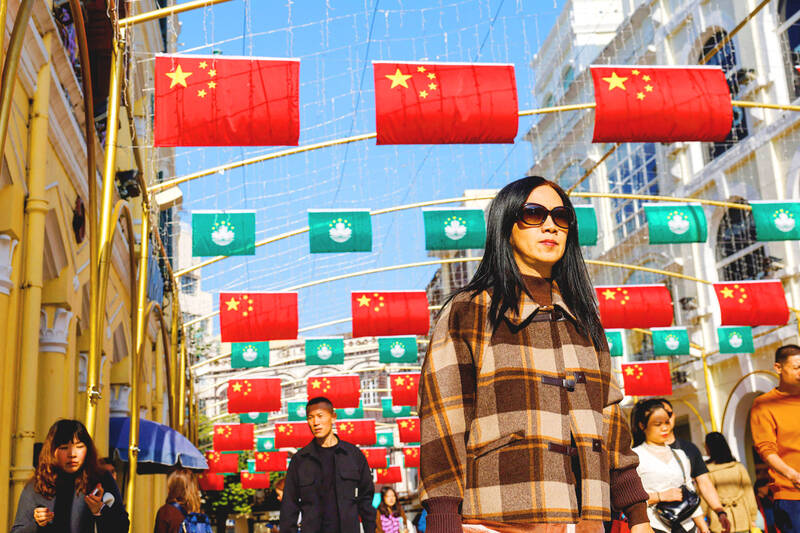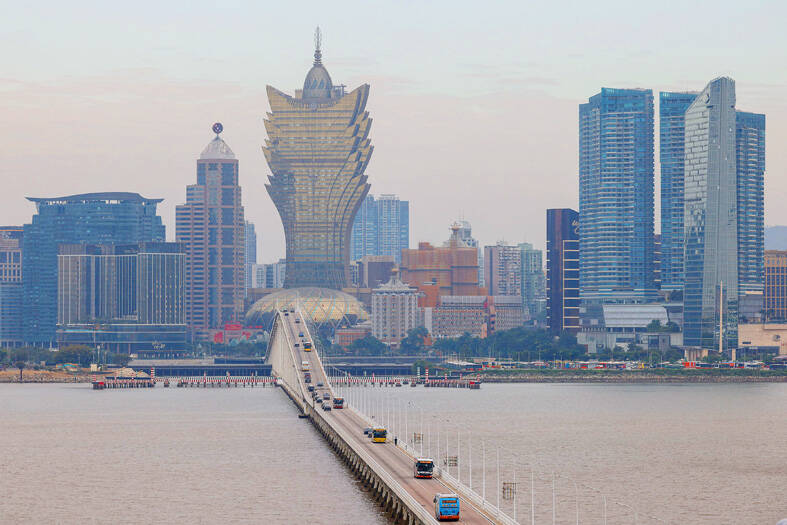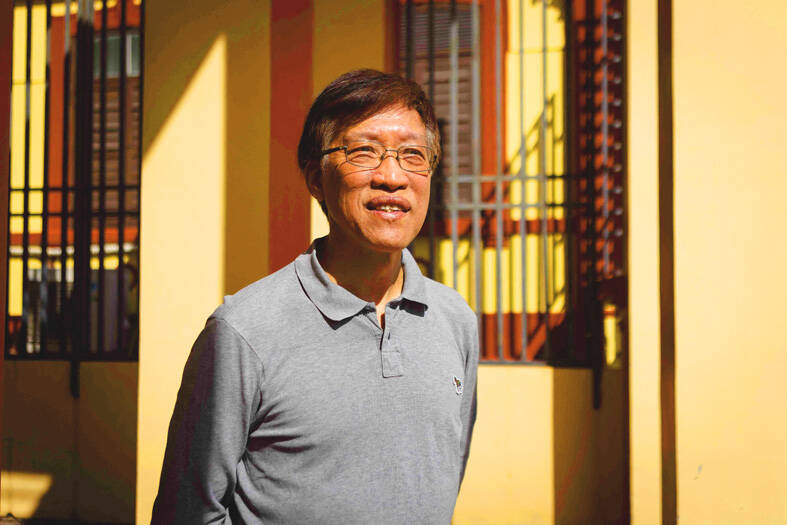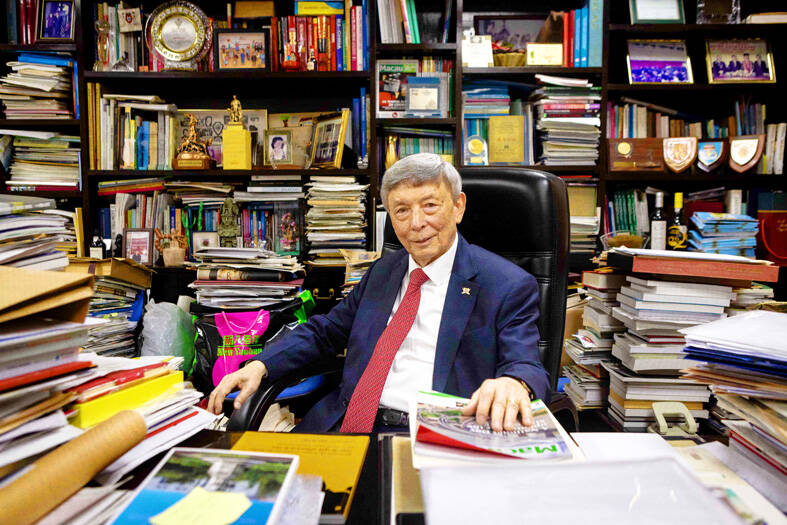A decade ago, the elegant cobblestone streets of Macau’s Tap Seac Square were jam-packed with people clamouring for change and government accountability — the high-water mark for the former Portuguese colony’s political awakening.
Now as Macau prepares to mark the 25th anniversary of its handover to China tomorrow, the territory’s democracy movement is all but over and the protests of 2014 no more than a memory.
“Macau’s civil society is relatively docile and obedient, that’s the truth,” said Au Kam-san (歐錦新), 67, a schoolteacher who became one of Macau’s longest-serving pro-democracy legislators.

Photo: Reuters
“But if that were totally true, we wouldn’t have our diversity of voices. Our young people have their own views,” he said.
Au entered politics after the 1989 Tiananmen Square crackdown, for years campaigning on issues such as livelihood, corruption and electoral reform.
On that day in May 2014, he helped organize a 20,000-strong rally to oppose a policy granting perks to retired officials, leading to a rare government concession.

Photo: Reuters
Today, public protests in Macau are just a memory after Beijing launched sweeping measures in the past five years that ousted opposition lawmakers and chilled free speech.
Ahead of the anniversary, multiple Macau democrats said they were warned not to make critical remarks in public.
“There is a strong sense of suppression, and the whole civil society has fallen silent,” Au said.

Photo: AFP
Macau reverted to Chinese rule in 1999 via a “one country, two systems” framework that promises a high degree of autonomy, separate legal system and stronger safeguards for civil liberties than those on the mainland.
However, unlike neighboring Hong Kong, Macau was never offered a guarantee of wider democratization in the Basic Law, its mini constitution.
Jorge Rangel (黎祖智), a minister in Macau’s final colonial administration, said democracy was not a priority when he and Chinese counterparts drafted the constitution.

Photo: AFP
“But I believe that at least the Macau members and some of the mainland members of the Basic Law [drafting committee] believed that it would be useful for Macau to have very active participation of the people,” Rangel, 81, said.
“My vision of one country, two systems is that we have a ... strong, active, independent civil society,” he said.
Macau’s 690,000 residents today have no say over the territory’s leader, who is selected by a committee of 400 pro-establishment figures.
Less than half of the legislators are elected by popular vote, and the pro-democracy camp has never won more than 15 percent of seats.
Unable to change the system from within, activists in the 2010s — including fresh faces like Jason Chao (周庭希) and Scott Chiang (鄭明軒) — explored ways to engage the public, such as keeping up the tradition of annual Tiananmen events.
Chao, 38, said activists also tried to spread progressive values, like trying to get “conservative” Macau to talk about LGBTQ+ rights, an uphill battle that yielded no clear payoff.
In 2014, he organized an online referendum — over the strident objections of Beijing representatives in Macau — asking the public if they supported universal suffrage for the territory’s leader.
More than 95 percent of the 8,700 respondents said “yes.”
“I felt [the results] were quite remarkable, and I’m grateful my team and I withstood the pressure to pull it off,” Chao said, adding the feat cannot be replicated now.
As recently as 2019, Chinese leaders praised Macau as a model of patriotism and stability — but as Hong Kong was rocked by huge and violent protests, Macau was not spared from the backlash.
In the 2021 legislature election, Chiang was among the pro-democracy candidates disqualified on grounds they failed to support the Basic Law or were “disloyal” to Macau.
“Some people at the time argued that we were moderates, different from the radicals in Hong Kong. Thinking back, this was of course entirely irrelevant,” Chiang, 43, said.
Chao and Chiang have emigrated and say they have no plans to return.
Democrats who remain see little cause for optimism.
Macau’s next leader, Sam Hou-fai (岑浩輝), was a top judge and one of his 2019 rulings massively restricted freedom of assembly, University of Macau academic Ieong Meng-u (楊鳴宇) said.
“On paper, Macau’s laws on assembly and protest are the most pro-free speech within the greater China region... [But] after the ruling came out, there have been no approved protests or rallies in Macau,” Ieong said.
Having decided not to run for re-election in 2021, ex-lawmaker Au had a frank assessment of his camp’s legacy.
“In terms of the political system we didn’t bring about any change.” Au said. “I admit that in the fight for democracy we have accomplished nothing.”
However, activists have changed civil society for the better, he said.
“Even though we are in a bitter winter, if there are changes to the external environment, these seeds in Macau may yet have a chance to sprout,” he added.

People with missing teeth might be able to grow new ones, said Japanese dentists, who are testing a pioneering drug they hope will offer an alternative to dentures and implants. Unlike reptiles and fish, which usually replace their fangs on a regular basis, it is widely accepted that humans and most other mammals only grow two sets of teeth. However, hidden underneath our gums are the dormant buds of a third generation, said Katsu Takahashi, head of oral surgery at the Medical Research Institute Kitano Hospital in Osaka, Japan. His team launched clinical trials at Kyoto University Hospital in October, administering an experimental

IVY LEAGUE GRADUATE: Suspect Luigi Nicholas Mangione, whose grandfather was a self-made real-estate developer and philanthropist, had a life of privilege The man charged with murder in the killing of the CEO of UnitedHealthcare made it clear he was not going to make things easy on authorities, shouting unintelligibly and writhing in the grip of sheriff’s deputies as he was led into court and then objecting to being brought to New York to face trial. The displays of resistance on Tuesday were not expected to significantly delay legal proceedings for Luigi Nicholas Mangione, who was charged in last week’s Manhattan killing of Brian Thompson, the leader of the US’ largest medical insurance company. Little new information has come out about motivation,

NOTORIOUS JAIL: Even from a distance, prisoners maimed by torture, weakened by illness and emaciated by hunger, could be distinguished Armed men broke the bolts on the cell and the prisoners crept out: haggard, bewildered and scarcely believing that their years of torment in Syria’s most brutal jail were over. “What has happened?” asked one prisoner after another. “You are free, come out. It is over,” cried the voice of a man filming them on his telephone. “Bashar has gone. We have crushed him.” The dramatic liberation of Saydnaya prison came hours after rebels took the nearby capital, Damascus, having sent former Syrian president Bashar al-Assad fleeing after more than 13 years of civil war. In the video, dozens of

ROYAL TARGET: After Prince Andrew lost much of his income due to his friendship with Jeffrey Epstein, he became vulnerable to foreign agents, an author said British lawmakers failed to act on advice to tighten security laws that could have prevented an alleged Chinese spy from targeting Britain’s Prince Andrew, a former attorney general has said. Dominic Grieve, a former lawmaker who chaired the British Parliament’s Intelligence and Security Committee (ISC) until 2019, said ministers were advised five years ago to introduce laws to criminalize foreign agents, but failed to do so. Similar laws exist in the US and Australia. “We remain without an important weapon in our armory,” Grieve said. “We asked for [this law] in the context of the Russia inquiry report” — which accused the government